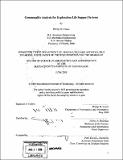Commonality analysis for exploration life support systems
Author(s)
Cunio, Phillip M
DownloadFull printable version (76.77Mb)
Other Contributors
Massachusetts Institute of Technology. Dept. of Aeronautics and Astronautics.
Advisor
Jeffrey A. Hoffman.
Terms of use
Metadata
Show full item recordAbstract
Commonality, defined practically as the use of similar technologies to deliver similar functions across a range of different complex systems, offers opportunities to improve the lifecycle costs of portfolios of complex systems. In this thesis, a proposed methodology for commonality analysis is tested by application to a portfolio of life support systems for planetary surface exploration. A database of environmental control and life support technology is developed and presented, and sets of system architectures for environmental control and life support systems are generated by models using the Object-Process Network (OPN) meta-language, which integrates information from the database. System architectures are downselected to a few interesting architectures, from which interesting potential portfolios are created, and commonality analysis is applied to these portfolios of complex environmental control and life support systems. The applied commonality analysis methodology estimates the total equivalent campaign mass to be transported to the planetary surface for exploration, the development cost of the necessary equipment, the mass of spares required by the equipment, and the number of unique items to be developed at various Technology Readiness Levels. Based on these analyses, recommendations for further technology development and appropriate commonality levels in future portfolios of complex systems are presented, and a summary of desirable future work concludes the thesis.
Description
Thesis (S.M.)--Massachusetts Institute of Technology, Dept. of Aeronautics and Astronautics, 2008. Includes bibliographical references (leaves 186-192).
Date issued
2008Department
Massachusetts Institute of Technology. Department of Aeronautics and AstronauticsPublisher
Massachusetts Institute of Technology
Keywords
Aeronautics and Astronautics.